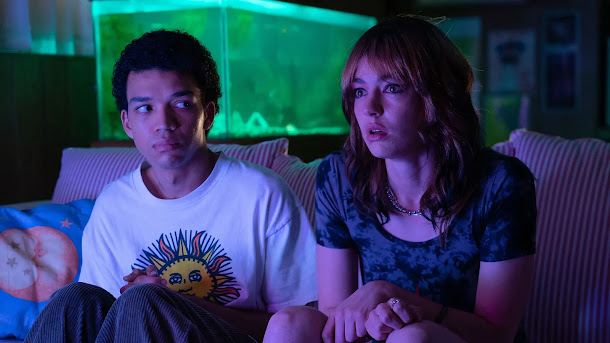"Anora" review: Sean Baker's sex work fairy tale isn't what you expect
“Anora,” 2023, directed by Sean Baker
★★★★½
If Sean Baker’s oeuvre is seen as a large-scale examination of class divides and how they present themselves in sex work, as seen in 2021’s "Red Rocket" and 2015’s "Tangerine", then it would appear that his newest, the snappy, brazen, and emotionally sweeping “Anora”, is his magnum opus. Although it only takes place over the course of two short weeks, its relentless effusivity, humor and bittersweet self-awareness make “Anora” feel like a classical epic. Some may find the emotional whiplash of its peaks and valleys hard to swallow, but its psychological adhesiveness will leave few wondering why it snagged the Palme d’Or at the Cannes film festival earlier this year.Anora, or “Ani” as she prefers to be called (a fiery, spellbinding Mikey Madison), is a Russian-speaking stripper at an upscale Manhattan club. Thanks to her second language, she finds herself in a private room with Ivan “Vanya” Zakharov, the fresh-faced and immature child of a Russian oligarch (a hilarious Mark Eydelshteyn). When Ivan inquires about paying for sex, and Ani accepts, she’s swept into Ivan’s world, fueled by his boyish, devil-may-care attitude. Eventually, the two get married on a whim in Las Vegas, with the shotgun ceremony set to Take That’s “Greatest Day”. Thus ends the euphoric build of the first act.
Baker, who also wrote and edited the film, does an excellent job in manipulating the audience, expertly misleading us into believing that Anora’s happenstance of a Cinderella story could possibly be what it appears, despite Ivan’s obvious red flags. Ivan is painfully sheltered and oblivious; he shows no care for Ani’s pleasure despite the frequency of their intercourse and throws his fathers money away on copious amounts of cocaine and alcohol. But the way the light hits Baker’s 35mm film stock in his lengthy, joyous montages set to pop ballads places us in Ani’s shoes, away from the looming catastrophe stemming from the source of Ivan’s wealth.
Things begin to crack when three men working for Ivan’s father arrive to forcefully enter his home and annul the marriage. Ivan abandons Ani in the scuffle, leaving her with Toros (Karren Karagulian), Garnick (Vache Tomasyan), and Igor (Yura Borisov), a trio that will come to be the comedic heartbeat of the film. After a long struggle, Ani eventually agrees to help the three track down Ivan in exchange for a large sum of money.
This stage of the film is shot entirely differently; with virtually no leads, the four characters are followed by a handheld camera on dimly-lit New York streets, aggressively approaching strangers and interrogating them about Ivan’s whereabouts. What’s especially notable about this extended sequence is Baker’s choice to orchestrate these scenes with real unsuspecting New Yorkers, sending the actors out to ask people questions in character and having them sign release forms after the fact. These methods give way to an effectually stressful, hilarious and unexpected turn, and paves a road towards the more realistic world of the film’s tragic ending. When that tragic ending, that won’t be fully spoiled here, comes, it feels forgone. It’s less of a rug-pull and more of an angry slap in the face or a cold bucket of water dumped on the audience’s head. Everything comes crashing down in a heartbreaking manner, but never without empathy for Anora herself.
Madison, as many have noted, is a force, but her support is as well; Eydelshteyn is a simultaneously endearingly goofy and infuriatingly apathetic, Borisov is dryly funny and, towards the end, an emotional sounding board for both Ani and the film’s themes. These performances in combination with Baker’s breakneck pacing and trust in the viewer’s emotional endurance creates a world outside of just what we see in the film – “Anora” prods at us to believe that this story is entirely plausible and its circumstances and sorrow exist in the here and now.
What makes Sean Baker’s films, and especially “Anora”, so enthralling and memorable is their raw depiction of a heightened reality. They throw us into the thick of specificity and in doing so imply a tsunami of structurally shackling societal factors. “Anora”, thanks to Baker’s proclivities – in both subject matter and aesthetics – and Mikey Madison’s beautifully overstated performance, secure it as Baker’s best and an instant classic.



Comments
Post a Comment